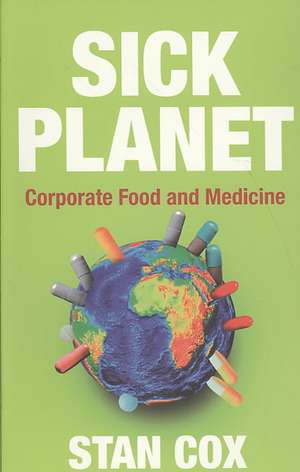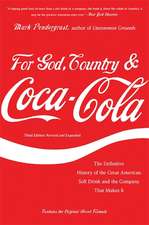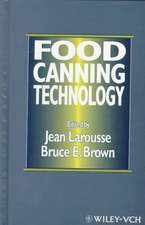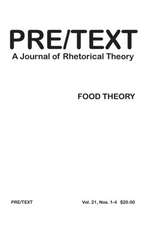Sick Planet: Corporate Food and Medicine
Autor Stan Coxen Limba Engleză Paperback – 19 mar 2008
Scientist Stan Cox expertly draws out the strong link between Western big business and environmental destruction. This is a shocking account of the huge damage that drug manufacturers and large food corporations are inflicting on the health of people and crops worldwide. Companies discussed include Wal-Mart, GlaxoSmithKline, Tyson Foods and Monsanto. On issues ranging from the poisoning of water supplies in South Asia to natural gas depletion and how it threatens global food supplies, Cox shows how the demand for profits is always put above the public interest.
While individual efforts to "shop for a better world" and conserve energy are laudable, Cox explains that they need to be accompanied by an economic system that is grounded in ecological sustainability if we are to find a cure for our Sick Planet.
Preț: 205.96 lei
Nou
Puncte Express: 309
Preț estimativ în valută:
39.41€ • 41.15$ • 32.62£
39.41€ • 41.15$ • 32.62£
Carte tipărită la comandă
Livrare economică 04-18 aprilie
Preluare comenzi: 021 569.72.76
Specificații
ISBN-13: 9780745327402
ISBN-10: 0745327400
Pagini: 224
Ilustrații: 8 tables
Dimensiuni: 135 x 215 x 15 mm
Greutate: 0.26 kg
Editura: PLUTO PRESS
Colecția Pluto Press
ISBN-10: 0745327400
Pagini: 224
Ilustrații: 8 tables
Dimensiuni: 135 x 215 x 15 mm
Greutate: 0.26 kg
Editura: PLUTO PRESS
Colecția Pluto Press
Notă biografică
Stan Cox is a senior scientist at The Land Institute in Salina, Kansas. He worked for the US Department of Agriculture from 1984 to 1996 and has a Ph.D. in plant genetics.
Cuprins
Preface
1. Health care's malignant growth
2. Feeling OK? Are you sure?
3. Side effects may be severe
4. Swallowing the Earth whole
5. "Agroterrorists" can take a vacation
6. Down-to-a-trickle economics
7. Supernatural food
8. The world is your kitchen
9. Political impossibility vs. biological impossibility
Notes
Further Reading
Index
1. Health care's malignant growth
2. Feeling OK? Are you sure?
3. Side effects may be severe
4. Swallowing the Earth whole
5. "Agroterrorists" can take a vacation
6. Down-to-a-trickle economics
7. Supernatural food
8. The world is your kitchen
9. Political impossibility vs. biological impossibility
Notes
Further Reading
Index














